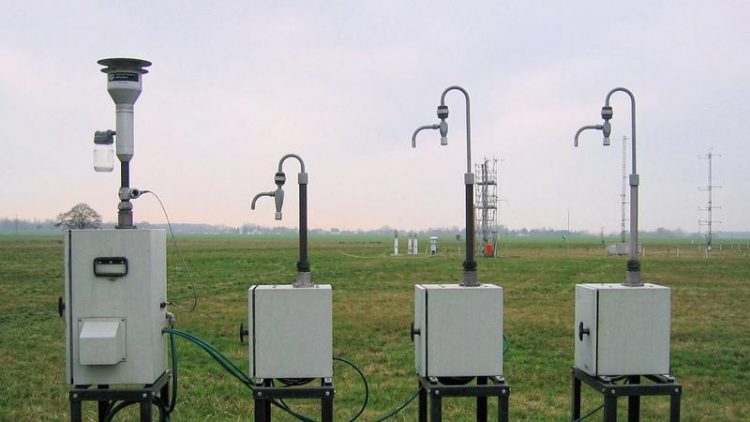European team of Aerosol researchers with participation of TROPOS awarded

TROPOS station Melpitz in winter 2004. Photo: Gerald Spindler/TROPOS
The selection has been made by an international committee of eminent scientists from six countries. „Your contributions are truly seminal and have been recognized as such by your peers. The high quality of science represented by these publications is what makes Atmospheric Environment a premier journal in the field. Once again, we congratulate you and look forward to your continued and fruitful association with the journal“, said editor-in-chief Dr Hanwant Singh of NASA Ames Research Center. „We are really happy about this award because it appreciate our intensive international cooperation“, said Prof Alfred Wiedensohler of TROPOS, who initialise 2004 this paper. Since 2012 he is one of the three editors-in-chief of the journal but was not involved in the jury and surprised by the award.
Melpitz was one of the 24 sites in Europe, where the researchers were evaluating the chemical properties of the fine dust of the orders of magnitude less than 2.5 microns (PM2.5) and less than 10 micrometers (PM10). The TROPOS research station is located in the Saxon lowlands near Torgau on the Elbe river and is now an internationally recognized regional background station. Since 2013 Melpitz is officially part of the Global Earth Observation System of the World Meteorological Organization WMO. In Germany, there are only three of these regional stations of the Global Atmospheric Watch (GAW). With the official start as a regional station, WMO had assessed the long-term work of the TROPOS for the Study of particulate matter and trace gases. In collaboration with the Environmental Protection Agency (UBA), the station is also integrated into the European EMEP program to monitor the remote transport of air pollutants. It is also part of the European scientific infrastructure network ACTRIS and the German ultrafine aerosol monitoring network GUAN. “The research station Melpitz is representative for air pollution in Central Europe. Our station is also representative of a large part of the Saxon lowlands and beyond for East Germany, “says station manager Dr. Gerald Spindler of the TROPOS about the importance of measurements. The researchers want there to complement ground-based in situ measurements in the future by remote sensing methods.
Tilo Arnhold
Further information:
Leibniz Institutes for Tropospheric research (TROPOS)
Prof Alfred Wiedensohler, Head of the Department Experimental Aerosol & Cloud Microphysics
phone +49-341-2717-7062
http://www.tropos.de/en/institute/about-us/employees/alfred-wiedensohler/
and
Dr Gerald Spindler, officer of research station Melpitz
phone: +49 341 2717-7027
http://www.tropos.de/en/institute/about-us/employees/gerald-spindler/
and
Dr Konrad Müller, chemist
phone: +49 341 2717-7030
http://www.tropos.de/en/institute/about-us/employees/konrad-mueller/
as well
Tilo Arnhold, TROPOS public releations
phone: +49-341-2717-7189
http://www.tropos.de/en/current-issues/press-releases/
Publication:
Jean-P. Putaud, Frank Raes, Rita Van Dingenen, Erika Brüggemann,
M.-Cristina Facchini, Stefano Decesari, Sandro Fuzzi, Robert Gehrig,
Cristoph Hüglind, Paolo Laje, Gundi Lorbeer, Willy Maenhaut,
Nikolaos Mihalopoulos, Konrad Müller, Xavier Querol, Sergio Rodriguez,
Jürgen Schneider, Gerald Spindler, Harry ten Brink, Kjetil Torseth,
Alfred Wiedensohler (2014): A European aerosol phenomenology 2: chemical
characteristics of particulate matter at kerbside, urban, rural and background sites in Europe. Atmos. Environ., 38, 16, 2579-2595, 2004.
http://dx.doi.org/10.1016/j.atmosenv.2004.01.041
Links:
Haagen-Smit Prize:
http://www.elsevier.com/awards/global/haagen-smit-prize
TROPOS Research site Melpitz
http://www.tropos.de/en/research/projects-infrastructures-technology/coordinated-observations-and-networks/tropos-research-site-melpitz/
The Leibniz Institute of Tropospheric Research (TROPOS) is member of the Leibniz Society which consists of 89 independent research institutes. Research at these institutes ranges from natural-, engineering- and environmental research to economy, regional and social research to the humanities. Leibniz institutes work on questions relevant to society, economy and ecology. The institutes focus on knowledge- and application-oriented basic research. They operate scientific infrastructure and offer research-based service. The Leibniz society puts focus on knowledge transfer toward policy, science, economy, and the public sector. Leibniz institutes are in intensive cooperation with universities – including the ScienceCampi -, with industry and other partners in Germany and abroad. The institutes undergo high-quality, independent and transparent evaluations. Because of their importance for Germany, the Federal Government and the federal states fund the Leibniz-Society together. The Leibniz-Institutes employ around 17.000 staff, among them are 7.900 scientists. The total annual budget of the institutes is 1.5 Billion Euro.
http://www.leibniz-gemeinschaft.de/en/home/
Weitere Informationen:
Media Contact
All latest news from the category: Awards Funding
Newest articles

Largest magnetic anisotropy of a molecule measured at BESSY II
At the Berlin synchrotron radiation source BESSY II, the largest magnetic anisotropy of a single molecule ever measured experimentally has been determined. The larger this anisotropy is, the better a…

Breaking boundaries: Researchers isolate quantum coherence in classical light systems
LSU quantum researchers uncover hidden quantum behaviors within classical light, which could make quantum technologies robust. Understanding the boundary between classical and quantum physics has long been a central question…

MRI-first strategy for prostate cancer detection proves to be safe
Active monitoring is a sufficiently safe option when prostate MRI findings are negative. There are several strategies for the early detection of prostate cancer. The first step is often a…



